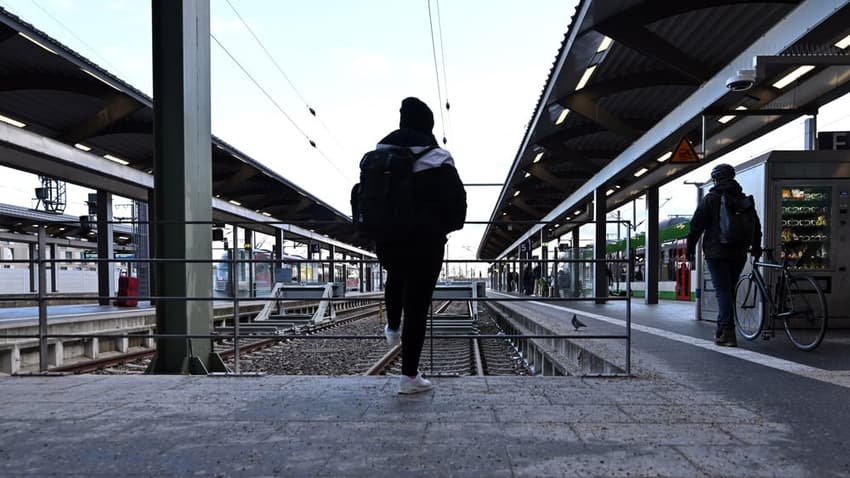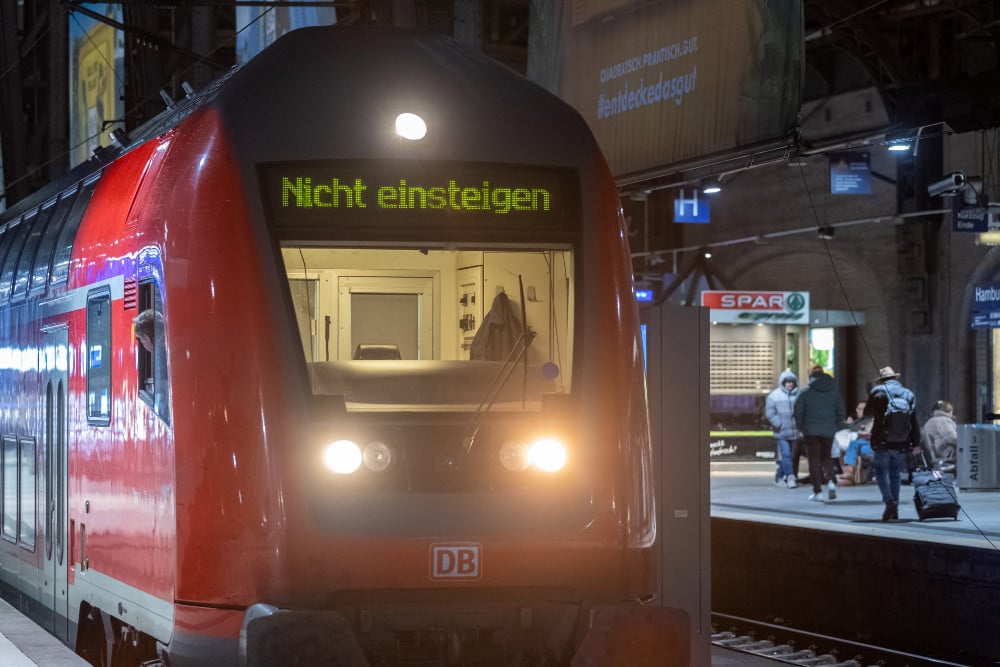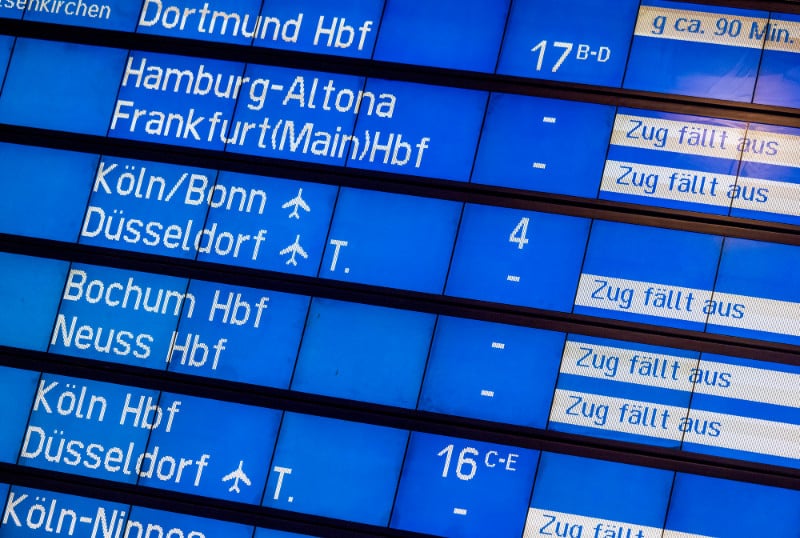EXPLAINED: Which train services are affected by Germany's six-day strike?

On Wednesday at 2 am, German train drivers began a six day strike, impacting about 80 percent of rail traffic. Yet there is still limited service around Germany: here's what passengers need to know.
The six-day strike, called for by German train drivers union GDL, affects Deutsche Bahn operated long-distance and regional trains, as well as the S-Bahn. Some services are still operating on a limited basis however, or private companies in the area are offering similar routes.
Passengers should also look out for the word 'Ersatzvehrkehr' - substitute transport services - as often replacement busses will run on the same route as trains which are not running at all. This is especially true for local services within cities.
We take a look at the main regions around Germany affected, and which options passengers have at their disposal. For more information about specific Deutsche Bahn routes running, you can check the company's website for the most up-to-date information available.
READ ALSO: How train travellers in Germany will be affected by the latest six-day strike
Berlin: While U-Bahn, bus and tram drivers are not striking, passengers can expect much fuller trains, especially for services which run parallel to the S-Bahn, such as the U5. An emergency timetable will once again apply for the Berlin S-Bahn during the strike.
There will be a 20-minute interval on the S3 (Erkner - Ostbahnhof), S46 (Königs Wusterhausen - Schöneberg), S5 (Strausberg Nord - Ostbahnhof) and S9 (Friedrichstraße - Schöneweide - BER Airport) lines.
Even before the strike, there were special substitute buses being used for the S1, S2, S25 and S26 lines due to the construction work in Berlin's Nordsüd-Tunnel, so these will not be affected by the strike.
Additional buses will also run on the S2 section between Südkreuz and Blankenfelde and on the S25 between Hennigsdorf and U Paracelsus-Bad and from Teltow Stadt to Lichterfelde Ost.
Deutsche Bahn also wants to run special trains on selected regional lines, which travel at a much slower interval. This applies to the RB10 and RB14 lines between Nauen and Berlin Südkreuz, the RE4 between Rathenow and Berlin and the RE2 between Berlin and Cottbus.
Hamburg/Schleswig-Holstein: Most of Deutsche Bahn's regional trains will not be running. The railroad companies AKN, Erixx and Metronom will not be on strike, but they may also be affected by the strike, for example due to a lack of staff in signal boxes.
While the Hamburger Hochbahn and buses in the Hanseatic city will be running as normal, there will be massive restrictions on S-Bahn services.
However, as was the case around two weeks ago, the S-Bahn will try to offer journeys on the S1, S2, S3 and S5 lines according to an emergency timetable.
READ ALSO: Train strike: How will transport in Germany's five largest cities be affected?

A train at Hamburg's main train station on Wednesday morning reads "Do not enter". Photo: picture alliance/dpa | Bodo Marks
Lower Saxony/Bremen: There will often be occasional trains on DB routes, for example between Bremen and Hanover and between Bremerhaven and Osnabrück. Between Cuxhaven and Hamburg, trains are to run every three hours, and on other regional connections sometimes even every two hours.
On other, less frequented connections, such as between Bremen and Uelzen and between Hanover and Hamburg via Soltau, replacement bus services will be running.
Mecklenburg-Western Pomerania: Individual trains are running on some regional lines, for example between Hamburg and Rostock or between Berlin and Stralsund. In some cases, buses will be provided as a replacement.
Some lines, such as the regional express between Lübeck and Szczecin in Poland, will have to be completely cancelled though.
North Rhine-Westphalia: According to the Zuginfo-NRW website, there will be no restrictions on as many as 40 regional express and regional train connections, as DB's competitors are operating here.
However, on a further 30 RE and RB lines, those which are served by Deutsche Bahn, there will be no service at all or only very irregular service during the strike. Replacement bus services will only be offered in isolated cases.
Some S-Bahn lines have significantly reduced their frequency, while others have been completely canceled.

A display screen in Düsseldorf on Wednesday morning shows that every scheduled train is no longer running due to the strike. Photo: picture alliance/dpa | Thomas Banneyer
Hesse and Frankfurt: Many DB regional express and regional train connections will be discontinued or will run every two hours at best. Connections operated by DB competitors Cantus, Hessische Landesbahn, Vias and Vlexx will run as normal.
The S-Bahn in Frankfurt will also see irregular service: The S1, S3, and S6 will run every hour. The S2 runs every hour between Offenbach Ost and Dietzenbach until around 8:00 pm. From 8:00 p.m., it will run every hour between Niedernhausen and Dietzenbach.
The S8 will run every hour between Wiesbaden and Offenbach Ost and every hour between Offenbach Ost and Hanau at the same times as the S9, which is completely canceled.
Thuringia/Saxony/Saxony-Anhalt: Deutsche Bahn wants to maintain a minimum service in these eastern states, which tend to have the highest participation of striking workers.
For example, the RE50 between Leipzig and Dresden will run every two to three hours. The RE connections between Glauchau and Göttingen, Erfurt and Nordhausen and Erfurt and Leinefelde are also to be operated every two hours.
Many regional trains in the Dresden area will be canceled and the S-Bahn trains there will run irregularly at best. The important S3 between Halle and Leipzig will at least be served every hour. In Saxony-Anhalt, there will only be service every four hours on numerous regional train routes, while elsewhere replacement buses will also only run every four hours.
Not affected by the strike is the Mitteldeutsche Regiobahn, which operates, for example, the RE between Leipzig and Chemnitz and between Dresden and Hof.
READ ALSO: Why are German train drivers launching more strike action?
Baden-Württemberg: The regional trains operated by Go-Ahead, SWEG and WEG are not on strike. Local urban transport services not provided by DB, such as the light rail system in Stuttgart, are also running as normal. However, there are considerable problems with DB's regional services.
There are no trains running on many lines or the service is extremely sparse.
Rhineland-Palatinate/Saarland/Rhine-Neckar: The S-trains in the greater region around Mannheim, Heidelberg and Ludwigshafen are either completely canceled or only run every two hours.
The emergency plan also provides for two-hourly services on many connections. However, certain sections will often not be served. Some RE and RB connections will also have to be canceled completely. However, individual routes, such as those between Trier and Homburg in Saarland, will largely be operated regularly once an hour.
With reporting from DPA.
Comments
See Also
The six-day strike, called for by German train drivers union GDL, affects Deutsche Bahn operated long-distance and regional trains, as well as the S-Bahn. Some services are still operating on a limited basis however, or private companies in the area are offering similar routes.
Passengers should also look out for the word 'Ersatzvehrkehr' - substitute transport services - as often replacement busses will run on the same route as trains which are not running at all. This is especially true for local services within cities.
We take a look at the main regions around Germany affected, and which options passengers have at their disposal. For more information about specific Deutsche Bahn routes running, you can check the company's website for the most up-to-date information available.
READ ALSO: How train travellers in Germany will be affected by the latest six-day strike
Berlin: While U-Bahn, bus and tram drivers are not striking, passengers can expect much fuller trains, especially for services which run parallel to the S-Bahn, such as the U5. An emergency timetable will once again apply for the Berlin S-Bahn during the strike.
There will be a 20-minute interval on the S3 (Erkner - Ostbahnhof), S46 (Königs Wusterhausen - Schöneberg), S5 (Strausberg Nord - Ostbahnhof) and S9 (Friedrichstraße - Schöneweide - BER Airport) lines.
Even before the strike, there were special substitute buses being used for the S1, S2, S25 and S26 lines due to the construction work in Berlin's Nordsüd-Tunnel, so these will not be affected by the strike.
Additional buses will also run on the S2 section between Südkreuz and Blankenfelde and on the S25 between Hennigsdorf and U Paracelsus-Bad and from Teltow Stadt to Lichterfelde Ost.
Deutsche Bahn also wants to run special trains on selected regional lines, which travel at a much slower interval. This applies to the RB10 and RB14 lines between Nauen and Berlin Südkreuz, the RE4 between Rathenow and Berlin and the RE2 between Berlin and Cottbus.
Hamburg/Schleswig-Holstein: Most of Deutsche Bahn's regional trains will not be running. The railroad companies AKN, Erixx and Metronom will not be on strike, but they may also be affected by the strike, for example due to a lack of staff in signal boxes.
While the Hamburger Hochbahn and buses in the Hanseatic city will be running as normal, there will be massive restrictions on S-Bahn services.
However, as was the case around two weeks ago, the S-Bahn will try to offer journeys on the S1, S2, S3 and S5 lines according to an emergency timetable.
READ ALSO: Train strike: How will transport in Germany's five largest cities be affected?

Lower Saxony/Bremen: There will often be occasional trains on DB routes, for example between Bremen and Hanover and between Bremerhaven and Osnabrück. Between Cuxhaven and Hamburg, trains are to run every three hours, and on other regional connections sometimes even every two hours.
On other, less frequented connections, such as between Bremen and Uelzen and between Hanover and Hamburg via Soltau, replacement bus services will be running.
Mecklenburg-Western Pomerania: Individual trains are running on some regional lines, for example between Hamburg and Rostock or between Berlin and Stralsund. In some cases, buses will be provided as a replacement.
Some lines, such as the regional express between Lübeck and Szczecin in Poland, will have to be completely cancelled though.
North Rhine-Westphalia: According to the Zuginfo-NRW website, there will be no restrictions on as many as 40 regional express and regional train connections, as DB's competitors are operating here.
However, on a further 30 RE and RB lines, those which are served by Deutsche Bahn, there will be no service at all or only very irregular service during the strike. Replacement bus services will only be offered in isolated cases.
Some S-Bahn lines have significantly reduced their frequency, while others have been completely canceled.

Hesse and Frankfurt: Many DB regional express and regional train connections will be discontinued or will run every two hours at best. Connections operated by DB competitors Cantus, Hessische Landesbahn, Vias and Vlexx will run as normal.
The S-Bahn in Frankfurt will also see irregular service: The S1, S3, and S6 will run every hour. The S2 runs every hour between Offenbach Ost and Dietzenbach until around 8:00 pm. From 8:00 p.m., it will run every hour between Niedernhausen and Dietzenbach.
The S8 will run every hour between Wiesbaden and Offenbach Ost and every hour between Offenbach Ost and Hanau at the same times as the S9, which is completely canceled.
Thuringia/Saxony/Saxony-Anhalt: Deutsche Bahn wants to maintain a minimum service in these eastern states, which tend to have the highest participation of striking workers.
For example, the RE50 between Leipzig and Dresden will run every two to three hours. The RE connections between Glauchau and Göttingen, Erfurt and Nordhausen and Erfurt and Leinefelde are also to be operated every two hours.
Many regional trains in the Dresden area will be canceled and the S-Bahn trains there will run irregularly at best. The important S3 between Halle and Leipzig will at least be served every hour. In Saxony-Anhalt, there will only be service every four hours on numerous regional train routes, while elsewhere replacement buses will also only run every four hours.
Not affected by the strike is the Mitteldeutsche Regiobahn, which operates, for example, the RE between Leipzig and Chemnitz and between Dresden and Hof.
READ ALSO: Why are German train drivers launching more strike action?
Baden-Württemberg: The regional trains operated by Go-Ahead, SWEG and WEG are not on strike. Local urban transport services not provided by DB, such as the light rail system in Stuttgart, are also running as normal. However, there are considerable problems with DB's regional services.
There are no trains running on many lines or the service is extremely sparse.
Rhineland-Palatinate/Saarland/Rhine-Neckar: The S-trains in the greater region around Mannheim, Heidelberg and Ludwigshafen are either completely canceled or only run every two hours.
The emergency plan also provides for two-hourly services on many connections. However, certain sections will often not be served. Some RE and RB connections will also have to be canceled completely. However, individual routes, such as those between Trier and Homburg in Saarland, will largely be operated regularly once an hour.
With reporting from DPA.
Join the conversation in our comments section below. Share your own views and experience and if you have a question or suggestion for our journalists then email us at [email protected].
Please keep comments civil, constructive and on topic – and make sure to read our terms of use before getting involved.
Please log in here to leave a comment.